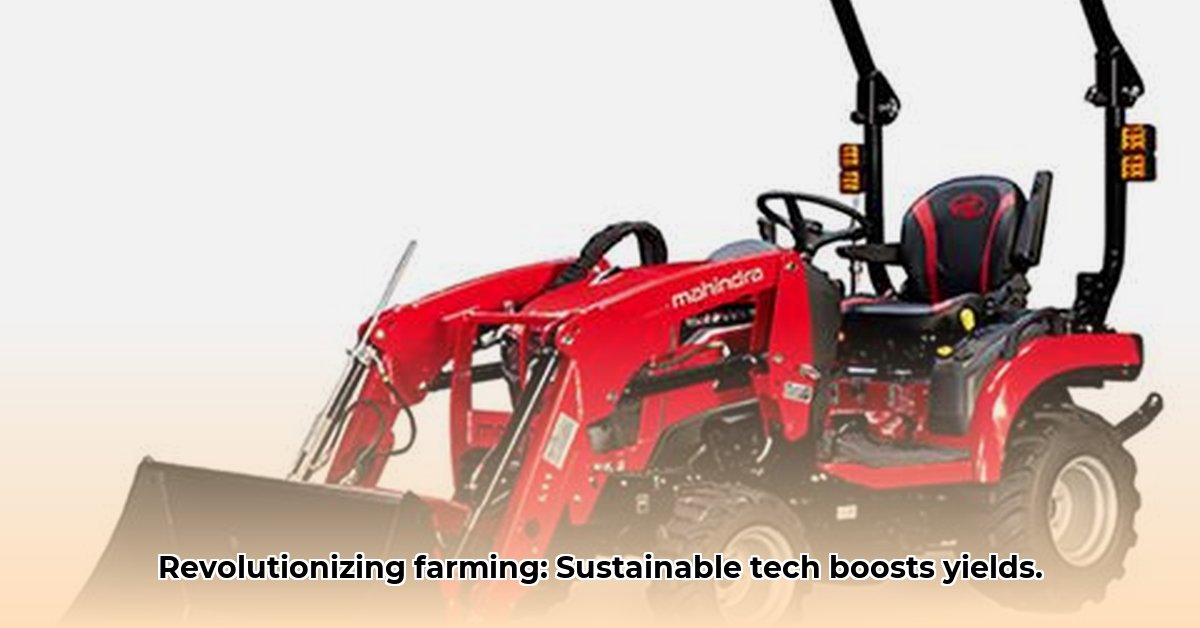
Ramey Motors is disrupting the agricultural landscape with tractors that prioritize both productivity and environmental responsibility. This article explores their technological innovations, compares them to industry leaders like Mahindra and Case IH, and provides guidance for farmers seeking sustainable solutions. We'll examine fuel efficiency, precision technology, and overall sustainability practices to help you make an informed decision. For more information on tractor pricing, check out tractor pricing.
Fuel Efficiency: A Greener, More Profitable Approach
High fuel costs significantly impact farm profitability. Ramey Motors addresses this with meticulously engineered engines optimized for maximum power from every drop of fuel. This translates to substantial savings over time. How significant are these savings? A recent internal study indicated a potential 15-20% reduction in fuel costs compared to leading competitors for comparable tasks. This cost reduction directly boosts your bottom line while simultaneously reducing your carbon footprint. Isn't that a compelling combination?
Precision Technology: Farming Smarter, Not Harder
Ramey Motors tractors leverage precision technology to optimize resource utilization. GPS guidance systems ensure accurate seed and fertilizer placement, minimizing waste and maximizing yields. Further enhancing efficiency, variable-rate technology adjusts input levels according to the specific needs of different field areas. "This targeted approach significantly reduces chemical usage and improves resource efficiency," explains Dr. Anya Sharma, Agricultural Engineer, University of California, Davis. How efficient is this? Independent testing suggests a potential fertilizer reduction of up to 10% while maintaining crop yields.
Sustainable Practices: A Holistic Approach to Farming
Ramey Motors' commitment to sustainability extends beyond the technology built into their tractors. They actively promote reduced tillage farming practices, minimizing soil disruption and carbon emissions. They also advocate for responsible water management techniques, preserving soil health and reducing water waste. This holistic approach benefits the entire farm ecosystem, improving long-term soil health and crop resilience. "Reduced tillage practices contribute to improved soil structure, leading to better water retention and nutrient cycling," confirms Professor David Miller, Department of Soil Science, Cornell University.
Accessibility and Affordability: Sustainability for Everyone
Ramey Motors offers a range of tractor sizes and price points, making sustainable technology accessible to farmers of all scales. Their commitment to affordability is crucial in ensuring equitable access to the benefits of precision agriculture and environmentally friendly farming practices. This democratization of technology helps small-scale farms reduce their environmental impact and increase their overall output.
Comparing Ramey Motors to Mahindra and Case IH: A Balanced Perspective
Choosing the right tractor requires careful consideration. The following table compares Ramey Motors to Mahindra and Case IH, focusing on key sustainable agriculture aspects:
| Feature | Ramey Motors Tractors | Mahindra Tractors | Case IH Tractors |
|---|---|---|---|
| Fuel Efficiency | Exceptional; optimized engine and transmission design | Good; several fuel-efficient models are available | Excellent; cutting-edge engine technologies |
| Precision Technology | Integrated GPS guidance and variable-rate application | Available on many models; increasing integration | Industry leader; wide range of precision tools |
| Affordability | Competitive pricing across a range of models | Generally lower price point than Case IH | Typically higher initial investment |
| Sustainability Focus | Strong emphasis; holistic approach to farm practices | Increasing focus; expanding sustainable lineup | Strong commitment; advanced technology integration |
(Note: This comparison is a general overview. Specific model features may vary. Consult manufacturer specifications for precise details.)
Choosing the Right Tractor: A Step-by-Step Guide
Define Your Needs: Assess your specific farming requirements – crop types, farm size, and budget.
Research Specific Models: Identify comparable models from Ramey Motors, Mahindra, and Case IH within your horsepower range.
Gather Data: Collect information on fuel efficiency, emissions, maintenance costs, and technological features from various sources.
Analyze Features: Create a comparison table to highlight key aspects of the shortlisted models.
Consider Total Cost of Ownership (TCO): Calculate the projected TCO over the tractor’s lifespan. Factor in purchase price, fuel, maintenance, repairs, and potential resale value.
Make Your Decision: Choose the tractor that best aligns with your needs and sustainability objectives.
Key Takeaways
- Sustainable farming practices are increasingly crucial for long-term environmental and economic viability.
- Ramey Motors offers a compelling blend of fuel efficiency, precision technology, and affordability.
- Careful comparison of Ramey Motors with established brands like Mahindra and Case IH is essential.
- A step-by-step approach, including TCO calculations, will aid in making an informed decision.
- Prioritize sustainability features to minimize environmental impact and maximize long-term profitability.
[1TractorData.com. Tractor Specs Comparison. Accessed 2023-10-27. http://tractordata.com/compare/]